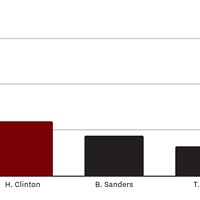Endangered
Why local news is a threatened species and what you can do to protect it
By Marcy Burstiner[
{
"name": "Top Stories Video Pair",
"insertPoint": "7",
"component": "17087298",
"parentWrapperClass": "fdn-ads-inline-content-block",
"requiredCountToDisplay": "1"
}
]
Consider the worm. Some species of worm are parasites that live off the human body. But others are essential to our ecosystem. They add nutrients to our soil that enable food to grow and they serve as essential food for all kinds of animals. Some worms have been so decimated by loss of habitat and overuse of fertilizers that we could lose them altogether. When people and governments realize that an important species is threatened, they should take steps to protect it.
The worm is a good metaphor for the press. Some media organizations seem to act like parasites — paparazzi who stake out celebrities and hordes of reporters who converge during scandals. But others are like the underappreciated earthworm: They filter out dirt to aerate our political and economic systems. The press is considered our fourth branch of government because we rely on it to keep a check on the other three, particularly in times like these when it seems as if the legislative and judicial branches are unable to rein in an out-of-control executive.
A species is considered endangered if it is threatened by over-utilization for commercial purposes; disease or predation; inadequacy of existing regulatory mechanisms; or other natural or manmade factors affecting its continued existence. That's the criteria for protecting the Palouse earthworm, which used to be prevalent in Washington and Idaho but is now almost extinct. And it seems like the same things are threatening the survival of our local press. Across the country, big, monopolistic corporations preyed on small community newspapers — starving them of resources — and our regulatory systems that should have prevented this from happening did nothing.
Consider the state of the nation's local press. According to the Center for Innovation and Sustainability in Local Media at the University of North Carolina, more than one in five papers have closed over the past 15 years. More than 2,000 counties now have no daily paper and almost 200 have no newspaper at all. In Humboldt County, we lost the Life and Times newspaper in Garberville in 2004 and the Klamath Kourier in Willow Creek in 2006.
In a report called "The Rise of the Ghost Newspaper," the Center for Innovation notes that more than 1,000 of the nation's surviving newspapers are "ghosts": The companies that own them cut the news staff so deep they can't adequately cover their communities. In particular danger are newspapers owned by Digital First Media, which owns our own Times-Standard and has slashed staff across its newspapers by more than twice the national average since 2012.
So how do you save an endangered species? First, we don't let big corporations develop endangered species habitat. So if we consider local press endangered, we shouldn't let investment banks and hedge funds buy them up to extract as much profit as they can from those media properties.
Next, we spend money. Governments or nonprofits buy up habitat land to preserve. We fund groups that nurture endangered animals. Maybe we should do so with our endangered press. It's not like we never bail out private industries on the brink of collapse. We've done it repeatedly for the auto industry, the banking industry and airline manufacturers. We prop up corporate corn, rice, soybean and cotton farms with billions of dollars in annual subsidies. In 2007, the city of Arcata bailed out the Humboldt Flakeboard company, which made particle board, with a $2.5 million loan to parent company Hambro in an effort to save 69 jobs. The company closed shop three years later, defaulting on the loan.
There are models for subsidies to the press. The federal government spends more than $400 million on the Corporation for Public Broadcasting, which funds National Public Radio and local public television stations. In Great Britain, people fund the British Broadcasting Corp. through $3 billion in TV license fees and the government kicks in another $600 million for people too poor to pay.
People used to be willing to support their local press. When I was a kid, we'd set aside $1.25 in a bowl by the door every Wednesday for the weekly subscription to the Herald Statesman and a tip for the delivery boy.
Then the internet came along with the ridiculous notion that you can get all the news you want for free, even though the people who gather the news, write it up, edit it, and format it for your apps and news feeds also need to eat, pay rent and raise their kids.
The problem is that some of us don't really need all the news all the time. We can live quite well in 90 percent ignorance. If you skip reading the news, the bus still runs and traffic lights still work. So why pay for it?
But occasionally we all do need the news. When a disaster hits, people grab for news. Even when we aren't paying attention to it, thousands of reporters diligently collect information that sometimes ends up exposing problems that affect our lives. Workplaces are now safer for many people because reporters at the New York Times and New Yorker exposed Harvey Weinstein as a sexual predator, which boosted the MeToo movement. Reporters regularly expose police misconduct, corruption by government officials, as well as corporations that pollute our environment, discriminate against customers and exploit workers. When news organizations die, it isn't as if these problems go away. They just go unexposed.
Reporters read boring reports and attend tedious meetings so you can safely ignore it all until the news is bad enough to warrant your attention. News reporters are like the people at the lube shop who change the oil on your car. It is a dirty job that you don't want to do yourself but it needs to be done, so you pay someone to do it. If you don't regularly change your oil, your car won't last. If we don't regularly clean up our political system, our democracy will break down.
We can ignore the news because we have people gathering it for us and they will let us know with news alerts when we have to pay attention. We know the army of news reporters out there is watching our backs.
But local news organizations are like the earthworm. Right now they are being suffocated by all the fertilizer thrown into the political system. They are under attack by predators. And they are being starved of resources that keep them alive. Too few people consider them worthy of conservation efforts. But if you are the type to want to save our endangered local press, here is how you can join the conservation movement:
1. Subscribe to a news organization. I subscribe to the New York Times, Washington Post and Mad River Union. It isn't a whole lot of money.
2. If you have a business, you can advertise in our local publications.
3. Support student media because they are the future of our press.
4. Donate to nonprofit news organizations. In California there is the Center for Investigative Reporting, CalMatters, Mother Jones magazine and Fairwarning, which focuses on consumer health and safety issues. The Institute for Nonprofit News has a directory that lists dozens of organizations in California.
Don't worry that you don't read the news all the time. You and I both know that we don't have to. But we do need to have it out there. So if you ever run into local reporters, give them a nod of respect. They are watching our backs.
Marcy Burstiner is chair of the Humboldt Center for Constitutional Rights, teaches journalism at Humboldt State and previously spent 15 years worming through a series of news organizations. Burstiner is dissatisfied with the use of non-gendered plural pronouns as a replacement for archaic gendered pronouns, and is trying to eliminate all pronouns from speech. If you need to address this recalcitrant writer, just say hey. And why in the world does the New York Times still address people as Mr. and Mrs.?
Speaking of...
-

NCJ's Greenson Wins Free Speech and Open Government Award
Feb 26, 2024 -

Reporters Wanted!
Jan 13, 2023 -

NCJ Editor Nabs National Food Writing Award
Sep 19, 2020 - More »
Comments (3)
Showing 1-3 of 3
more from the author
-
Sinclairly Yours
- Jun 7, 2018
- More »
Latest in News
Readers also liked…
-
Through Mark Larson's Lens
A local photographer's favorite images of 2022 in Humboldt
- Jan 5, 2023
-
'To Celebrate Our Sovereignty'
Yurok Tribe to host gathering honoring 'ultimate river warrior' on the anniversary of the U.S. Supreme Court ruling that changed everything
- Jun 8, 2023









































